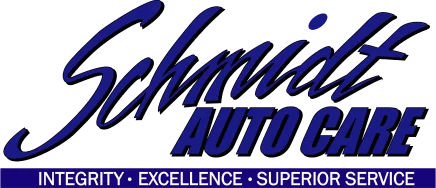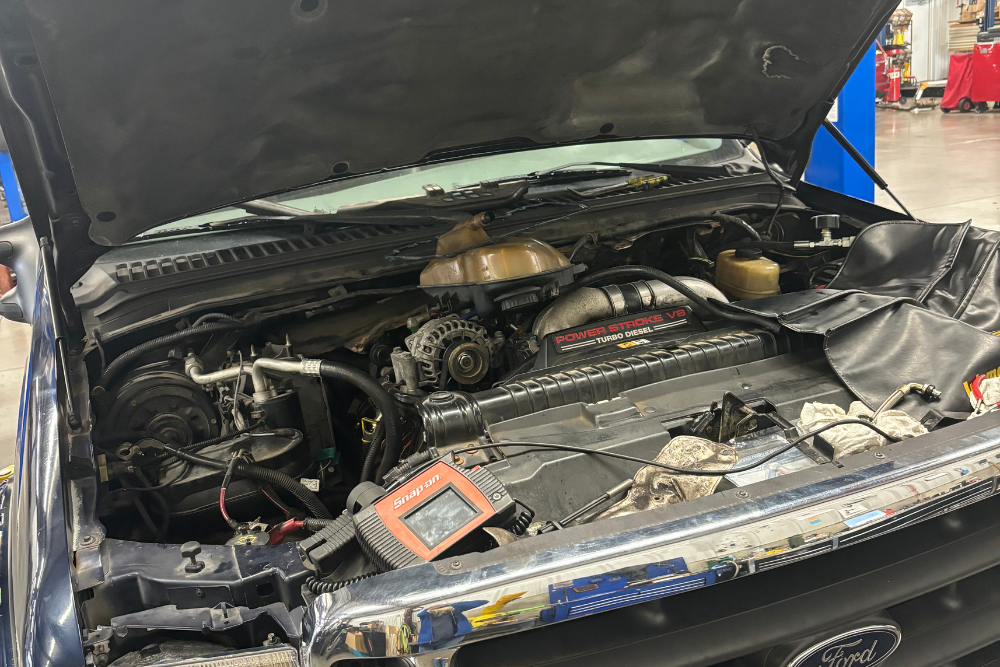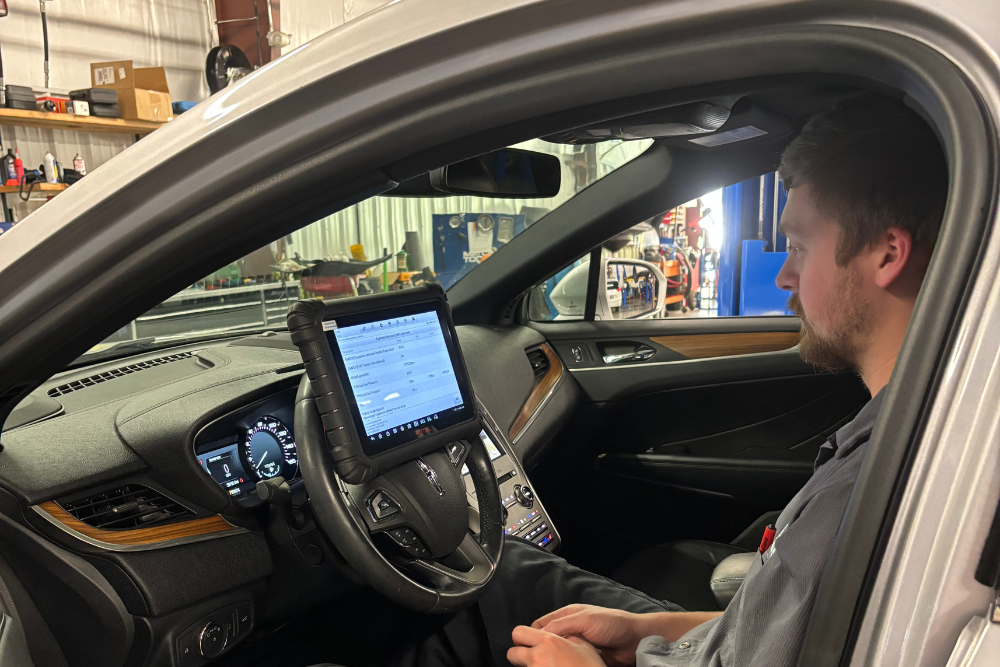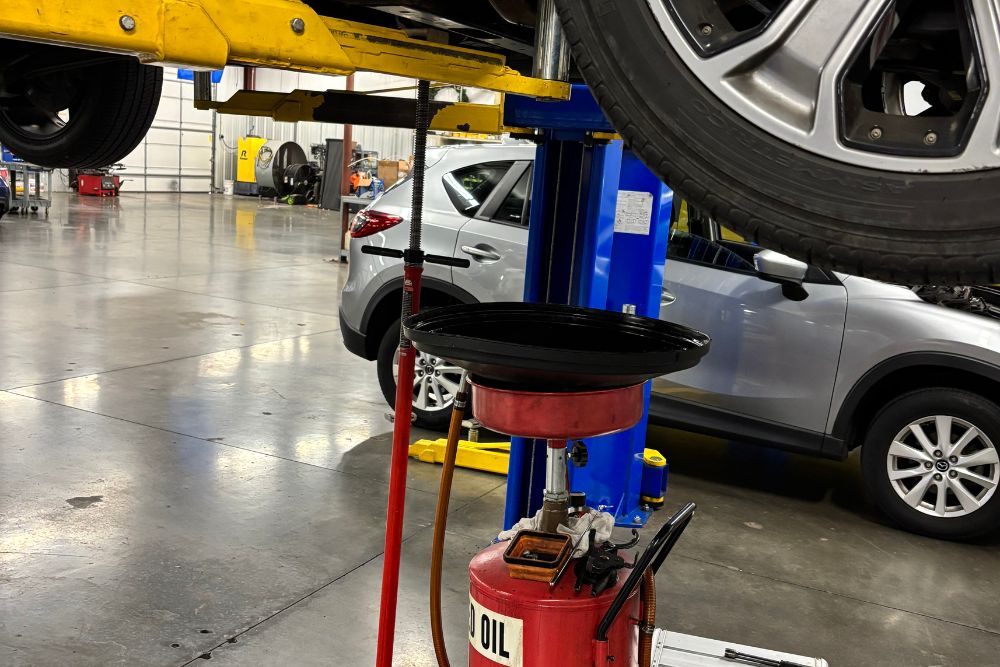Squealing Brakes in Springboro? What That Sound Means for Your Safety
- July 29, 2025
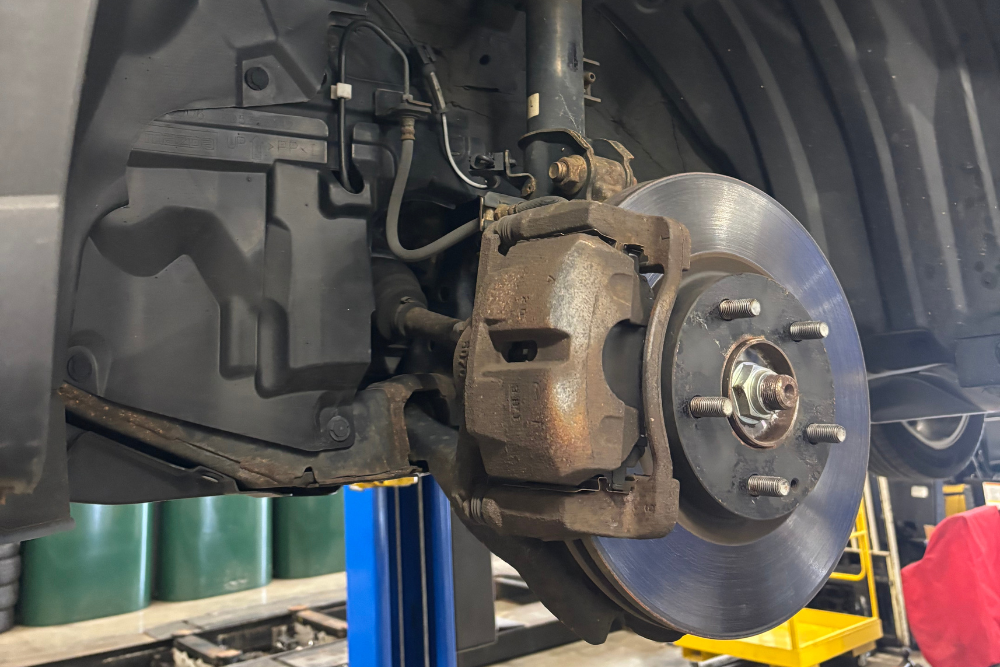
You press the brake pedal, and there it is again, that sharp, high-pitched squeal echoing through your car. It’s hard to ignore, and for good reason. Annoying? Definitely. Dangerous? Possibly. At Schmidt Auto Care, we hear this concern all the time, and we know how to tell the difference between harmless brake noise and a warning sign you shouldn’t ignore.
Whether it’s just a little moisture or a sign your brake pads are nearly worn out, that sound deserves attention. Left unchecked, it could lead to longer stopping distances, rotor damage, or costly repairs. In this guide, we’ll break down the common causes of squeaky brakes, how to know when to worry, and what to do when it’s time to search for trusted squeaky brakes repair or brake service near me.
Your brakes are your vehicle’s most important safety feature. Let’s make sure they’re working and sounding the way they should.
Why Do Brakes Squeak in the First Place?
Brakes are designed to make noise under certain conditions. That may sound surprising, but brake manufacturers often add wear indicators, small metal tabs that create a squeal once the pads have worn thin. However, there are many other reasons you might be hearing that sound.
Moisture and Morning Dew
If your brakes squeak in the morning and stop after a few uses, moisture is likely the culprit. Overnight condensation or light rain can leave a thin layer of rust on the rotors, which your brake pads scrape off during your first few stops.
Dust and Debris
Brake components, especially pads, create dust over time. When this dust collects on the rotors or pads, it can cause a temporary squealing noise. This is particularly common in dry, dusty environments or after driving on unpaved roads.
Glazed Brake Pads or Rotors
If your brakes have overheated, it can cause the pad surface to harden and glaze over. This reduces stopping efficiency and creates a consistent squealing sound. Glazing usually results from riding the brakes downhill or repeated hard stops in traffic.
Pad Material
Some brake pads, particularly metallic or ceramic types, are simply noisier by nature. While these materials may offer performance or durability benefits, they can also produce more squeal, especially when they’re new.
While some of these causes are benign, others are early warnings of real issues. So, how do you know the difference?
When Squeaky Brakes Mean Trouble
If your brakes are squealing consistently, getting louder, or accompanied by other symptoms like shaking, reduced braking power, or grinding sounds, it’s time to get them checked.
Worn Brake Pads
This is the most common cause of persistent brake squealing. Once your pads are worn below a certain thickness, the built-in wear indicators begin to touch the rotors and emit a constant squeak. Ignoring this can lead to metal-on-metal contact, rotor damage, and a much higher repair bill.
Rotor Problems
Warped or uneven rotors can create vibration, pulsation, and squealing. Often caused by excessive heat, rotors in this condition reduce your vehicle’s ability to stop safely and evenly. Replacing or resurfacing may be necessary.
Faulty Hardware or Stuck Calipers
Your braking system relies on several moving parts working together. If the caliper sticks or hardware becomes misaligned, your pads may stay partially engaged with the rotor, causing ongoing squealing and increased wear.
Don’t Wait, Get Your Brakes Checked Today!
If you’re hearing that squeaky sound, it could be a sign that your brakes need attention. Don’t let a small noise turn into a major issue or, worse, a safety concern. At Schmidt Auto Care, our ASE-certified technicians will give your brakes a thorough inspection and ensure you’re driving safely.
Book your brake inspection now to avoid costly repairs down the road and keep your car performing at its best!
Brake Vibration and Squeal: A Look Inside the System
Let’s take a brief detour into what causes that squeaky sound.
Squeaking results from vibrational energy, tiny movements between your brake pad, rotor, and caliper. These movements create high-frequency vibrations that translate into the pitch you hear as a squeal. Think of it like dragging your finger across the rim of a wine glass: the friction and vibration produce a tone.
Sometimes, even small issues like improperly installed anti-rattle clips or uneven pad wear can change that frequency just enough to cause noise. That’s why professional inspection matters. What seems like a minor nuisance can be a symptom of deeper wear or improper alignment.
The Hidden Costs of Ignoring the Squeal
You might think, “If it still stops fine, why worry?” But driving with squeaky brakes for too long can lead to serious consequences:
- Costlier repairs: Ignoring worn brake pads can lead to damaged rotors and significantly more expensive repairs down the line.
- Reduced stopping distance: Damaged brake components mean longer stops, and in emergencies, that could be the difference between safety and a collision.
- Lower vehicle value: A vehicle with worn brakes or damaged rotors can reduce resale or trade-in value.
Your brakes are your vehicle’s most important safety system. If they’re making noise, it’s their way of asking for help.
Brake Repair, the Schmidt Way: Safe, Simple, Transparent
At Schmidt Auto Care, we’ve handled everything from mild surface rust to severe brake wear. What makes us different is the way we diagnose and care for your vehicle with clarity, skill, and a commitment to doing the job right.
- Detailed Digital Inspections: We provide clear photos and simple explanations so you know exactly what’s happening with your brakes and why service may be needed.
- Trusted Certified Technicians: Our ASE-certified team has real-world experience with domestic, Asian, hybrid, and diesel vehicles. We focus on safety, accuracy, and quality, not shortcuts or unnecessary repairs.
- Convenient, Customer-Centered Options: With curbside drop-off, loaner vehicles, and text-to-pay, we make it easy to get expert service without interrupting your day. Our process is smooth, modern, and built around your schedule.
- A Higher Standard of Care: As a veteran-owned, family-run, and women-led shop, we’ve built a reputation for excellence and trust. Our facility is clean, welcoming, and pet-friendly, with a strong focus on community and customer care.
- Brake Service with Confidence: Every brake repair includes a 2-year, unlimited mileage warranty. We focus on education, not pressure, and treat every vehicle like it belongs to our own family.
Brakes, Balance, and the Safety of Your Entire Vehicle
Your brakes don’t work in isolation. They affect how your car interacts with ADAS systems, impact tire wear, and are key to safe handling. Squeaky brakes aren’t just about the noise; they’re about your connection to the road.
When you maintain your brakes properly, you extend the life of your suspension system, tires, and even fuel economy. It’s a chain reaction that starts with a single squeal.
How Often Should You Check Your Brakes?
At a minimum, have your brakes inspected:
- Every 10,000-12,000 miles
- Once per year, whichever comes first
- Anytime you hear unusual noise, feel pulsing, or experience longer stopping distances
Regular maintenance is your best defense against unexpected repairs. With our straightforward and transparent process, you’ll never be in the dark about your vehicle’s condition.
Frequently Asked Questions About Squeaky Brakes
Can cold weather make my brakes squeak more often?
Yes. In colder temperatures, brake components contract slightly, and moisture can freeze on the rotors. This combination often leads to temporary squeaking during the first few stops of the day. If the noise disappears after warming up, it’s likely temperature-related and not a cause for concern. However, if it continues, it’s worth getting inspected.
Is it dangerous to spray brake cleaner on squeaky brakes at home?
While brake cleaner can help remove surface contaminants like dust or rust, it’s not a long-term solution and must be used carefully. Spraying cleaner without addressing the root cause may temporarily silence the noise, but it won’t fix worn pads, rotor issues, or hardware problems. It’s best to let a professional handle persistent squeaks.
Do electric vehicles (EVs) experience brake squealing too?
Yes, and in some cases, even more noticeably. Since EVs use regenerative braking, their traditional brake systems are used less frequently. This reduced use can lead to surface corrosion and squeaking, especially if the car isn’t driven regularly. Routine brake inspections are still essential for EV owners.
Can brake squeaks affect my vehicle’s resale value?
Yes. A potential buyer or dealership may view brake noise as a sign of neglect or needed repairs, which can reduce the vehicle’s perceived value. Addressing the issue proactively shows that the car has been well-maintained and can help preserve resale appeal.
Will upgraded performance brake parts eliminate squeaking?
Not always. Some high-performance brake pads, especially those made of metallic or ceramic materials, are noisier by design. If you’re considering an upgrade, speak with a professional about pad options that balance performance, longevity, and quiet operation based on your driving habits.
Stop the Squeal Before It Stops You
That squeaky brake sound isn’t just annoying, it’s your car asking for attention. At Schmidt Auto Care, we treat your safety like our own. Whether it’s a simple fix or something more complex, we’ll take care of it with the integrity, excellence, and superior service we’re known for.
Your brakes keep you safe. Don’t compromise on safety. Book your brake inspection today and avoid costly repairs down the road.
Visit us at:
Schmidt Auto Care
285a Hiawatha Trail, Springboro, OH 45066
Call or text: 937-514-7860
Request an appointment online
Share:
